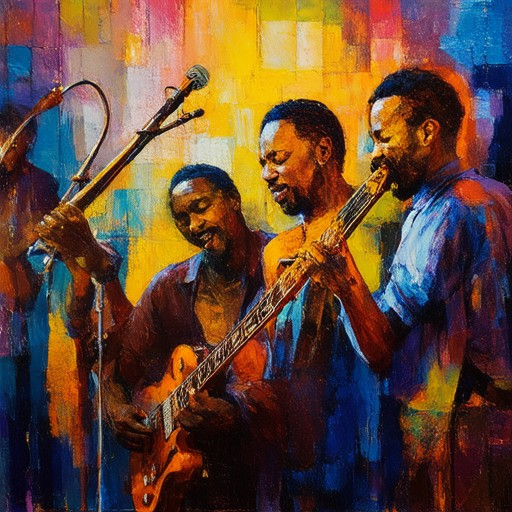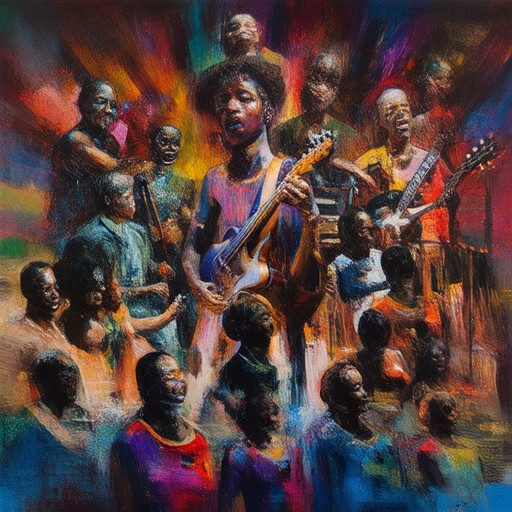Soul music is a powerful art form that transcends mere notes and chords, reaching deep into the human spirit. At its core lies the magical element of vocal improvisation, a technique that allows artists to convey emotions and stories in ways that words alone cannot. For those who delve into the world of soul music, mastering soul music vocal improvisation becomes a journey of self-discovery, creativity, and connection. Whether you’re a seasoned performer or just beginning, the ability to improvise authentically can elevate your craft and resonate deeply with your audience.
Key Takeaways
– Vocal improvisation is crucial for soul music, enabling authentic emotional expression and deep audience connections.
– It enhances musicality by exploring melodic patterns and harmonic variations, adding richness to performances.
– Developing a personal style in vocal improvisation requires studying iconic soul voices, daily practice, and a focus on storytelling through lyrics.
– Mastering emotional connection, technical skills, and breathing techniques are essential for improving vocal improvisation.
– Collaborating with musicians and drawing from diverse genres broadens creative possibilities and inspires innovative improvisation.

Techniques for Effective Vocal Improvisation in Soul Music
Vocal improvisation in soul music requires a unique blend of emotion, technique, and spontaneity. Here are some proven techniques to help you master this art form:
- Control Your Breath : Mastering breath control is essential for soulful improvisation. Use your diaphragm to support long, sustained notes and create dynamic shifts in rhythm.
- Phrasing and Timing : Soul music thrives on emotional phrasing. Learn to place notes strategically to convey the essence of the song, rather than just hitting every note perfectly.
- Scat Singing : Scat singing is a cornerstone of soul music improvisation. Create melodic lines by imitating instrumental solos and explore different pitch variations.
- Emotional Expression : Soul singers connect deeply with their audience by expressing raw emotion. Experiment with dynamics, tempo changes, and tone shifts to convey your feelings.
- Storytelling Through Lyrics : Choose lyrics that tell a story or evoke a strong emotion. Practice delivering them with authenticity to resonate with listeners.
- Group Improvisation : In a group setting, listen actively to other members and build upon their ideas. Syncopate and layer your vocals to create a richer sound.
- Practice with Backing Tracks : Use backing tracks of classic soul songs to mimic the phrasing and improvisational styles of legendary artists like Aretha Franklin or Stevie Wonder.
- Study Great Voices : Analyze recordings of soul legends to understand their vocal techniques, phrasing, and emotional delivery. Mimic their style to develop your own approach.
Recommended Artists to Study:
– Aretha Franklin
– Otis Redding
– Stevie Wonder
– Whitney Houston
– Donnie Hathaway
To further enhance your skills, explore Tiger Funk’s comprehensive guides on soul music history and vocal techniques. Discover how these timeless methods can transform your approach to performing and recording soul music.
Learn More About Soul Music History
Improving Vocal Improvisation Skills in Soul Music
To enhance your vocal improvisation skills in soul music, consider the following structured approach:
1. Understand the Foundation
- Listen to Icons:** Emphasize listening to legendary soul vocalists like Aretha Franklin and Marvin Gaye to study their phrasing and emotional delivery.
- Analyze Technique:** Break down their performances to understand timing, dynamics, and emotional expression.
- Experiment with Vowel Sounds:** Practice varying your voice using different vowel sounds to add texture to your improvisations.
2. Develop Technical Skills
- Breath Control:** Master diaphragmatic breathing to support sustained notes and prevent air loss during improvisation.
- Practice Scat Singing:** Start with known melodies and experiment with creating spontaneous phrases, using Tiger Funk’s resources for guidance.
- Warm-Ups:** Incorporate vocal warm-ups, such as humming scales, to prepare your voice before practice sessions.
3. Learn from Greats
- Study Iconic Performances:** Transcribe and analyze solos from artists like Stevie Wonder and Donnie Hathaway to understand their compositional choices.
- Seek Mentorship:** Consider joining mastermind groups or hiring a vocal coach for targeted feedback and guidance.
4. Practice Consistently
- Daily Routine:** Dedicate 15-30 minutes daily to vocal exercises and improvisation, tracking progress through recordings.
- Record and Review:** Use a smartphone or laptop to record sessions, focusing on areas needing improvement and celebrating progress.
5. Collaborate and Network
- Join Communities:** Engage with online forums or local groups to find collaborators and receive feedback in a supportive environment.
- Participate in Jams:** Organize or join live sessions with fellow musicians to test your improvisation skills in real-time.
6. Stay Inspired and Motivated
- Immerse Yourself:** Explore the cultural history of soul music through books, documentaries, and articles on Tiger Funk to reignite passion.
- Set Goals:** Establish achievable weekly objectives, such as learning a new song or focusing on a specific vocal aspect, to maintain momentum.
By systematically applying these strategies, you can develop your vocal improvisation skills in soul music, gaining confidence and a deeper connection with the genre’s expressive nuances.

Improving Vocal Improvisation Skills in Soul Music
To enhance your vocal improvisation skills in soul music, consider the following structured approach:
1. Understand the Foundation
- Listen to Icons:** Emphasize listening to legendary soul vocalists like Aretha Franklin and Marvin Gaye to study their phrasing and emotional delivery.
- Analyze Technique:** Break down their performances to understand timing, dynamics, and emotional expression.
- Experiment with Vowel Sounds:** Practice varying your voice using different vowel sounds to add texture to your improvisations.
2. Develop Technical Skills
- Breath Control:** Master diaphragmatic breathing to support sustained notes and prevent air loss during improvisation.
- Practice Scat Singing:** Start with known melodies and experiment with creating spontaneous phrases, using Tiger Funk’s resources for guidance.
- Warm-Ups:** Incorporate vocal warm-ups, such as humming scales, to prepare your voice before practice sessions.
3. Learn from Greats
- Study Iconic Performances:** Transcribe and analyze solos from artists like Stevie Wonder and Donnie Hathaway to understand their compositional choices.
- Seek Mentorship:** Consider joining mastermind groups or hiring a vocal coach for targeted feedback and guidance.
4. Practice Consistently
- Daily Routine:** Dedicate 15-30 minutes daily to vocal exercises and improvisation, tracking progress through recordings.
- Record and Review:** Use a smartphone or laptop to record sessions, focusing on areas needing improvement and celebrating progress.
5. Collaborate and Network
- Join Communities:** Engage with online forums or local groups to find collaborators and receive feedback in a supportive environment.
- Participate in Jams:** Organize or join live sessions with fellow musicians to test your improvisation skills in real-time.
6. Stay Inspired and Motivated
- Immerse Yourself:** Explore the cultural history of soul music through books, documentaries, and articles on Tiger Funk to reignite passion.
- Set Goals:** Establish achievable weekly objectives, such as learning a new song or focusing on a specific vocal aspect, to maintain momentum.
By systematically applying these strategies, you can develop your vocal improvisation skills in soul music, gaining confidence and a deeper connection with the genre’s expressive nuances.

The Significance of Vocal Improvisation in Soul Music
Vocal improvisation plays a pivotal role in soul music, serving as a cornerstone of its emotional depth and artistic expression. This spontaneous technique allows artists to convey genuine feelings and tell stories that resonate with listeners on a profound level. Here’s a breakdown of its importance:
- Emotional Connection : Soul music thrives on authenticity, and vocal improvisation amplifies this authenticity. By improvising, artists can react to the moment, reflecting the raw emotions of the song and connecting deeply with audiences. This connection fosters a sense of unity and shared experience, making soul music uniquely powerful.
- Musicality Enhancement : Improvisation adds layers to soulful performances. As artists explore melodic possibilities and harmonic variations, they often create intricate vocal patterns that elevate the track. This process not only enriches the musicality but also showcases the versatility of the vocalist.
- Creative Expression : Vocal improvisation provides a canvas for artists to express themselves freely. Unlike rigid structures, this approach allows for organic development, turning a simple melody into a moving narrative. This creativity is particularly evident in genres influenced by soul, such as jazz and blues.
- Differentiation from Other Genres : While many genres employ improvisation, soul music does so with a distinct intentionality. The focus is less on technical skill and more on conveying heartfelt emotion, making it a unique art form.
- Legacy and Influence : Many iconic soul performances are defined by their live improvisations. Artists like Aretha Franklin and Stevie Wonder have redefined vocal improvisation, proving its timeless appeal and its lasting impact on music.
Understanding the significance of vocal improvisation in soul music reveals its central role in preserving the genre’s authenticity and fostering a deeper appreciation for its artistic value.
Developing Your Personal Style in Soul Music Vocal Improvisation
To craft a distinctive style in soul music vocal improvisation, begin by immersing yourself in the essence of soul—emotional expression, authenticity, and storytelling. Here’s a structured approach to help you emerge as a unique artist:
1. Study Iconic Voices
- Listen and Analyze : Start by studying legendary soul vocalists like Aretha Franklin, Stevie Wonder, and Otis Redding. Pay attention to their phrasing, dynamics, and emotional delivery.
- Adapt and Innovate : While inspired by these icons, aim to adapt their techniques into your own style. Incorporate unique twists, such as scat singing or unconventional harmonies, to set yourself apart.
2. Daily Practice and Experimentation
- Soulful Practice Routine : Dedicate daily time to vocal exercises and improvisation. Sing along to soul tracks, experimenting with melodic variations and rhythmic explorations.
- Explore Sounds : Use loop pedals or effects to layer sounds and create spontaneous arrangements. Record sessions to hear your progress and identify areas for growth.
3. Understand Lyrics and Storytelling
- Lyric Connection : Deepen your connection with the words by personalizing them with your experiences. This authenticity enhances your ability to convey meaningful narratives.
- Rhythmic Sensitivity : Develop a keen ear for rhythm and timing, allowing your voice to naturally flow with the music’s pulse.
4. Collaborate and Seek Feedback
- Jam Sessions : Engage in collaborative settings with diverse musicians to gain exposure to various styles and receive immediate feedback.
- Constructive Criticism : Welcome critiques to refine your approach and uncover blind spots. Consider recording your performances for self-assessment.
5. Stay Curious and Open-Minded
- Continuous Learning : Explore workshops, courses, and communities dedicated to soul music. This engagement fosters creativity and provides fresh perspectives.
- Cultural Influence : Reflect on how your background influences your style. Drawing from personal experiences enriches your expressions and adds layers of authenticity.
6. Embrace Growth and Patience
- Journey of Growth : Recognize that developing a unique style is a gradual process. Celebrate small victories and remain open to evolving your approach.
- Enjoy the Process : View improvisation as a journey rather than a destination. Enjoy experimenting, making mistakes, and discovering your voice along the way.
By integrating these strategies, you’ll cultivate a personal style in soul music vocal improvisation that authentically reflects your identity and resonates deeply with your audience.

What are the best tips for improving vocal improvisation in soul music?
Tiger Funk’s expert guide to enhancing vocal improvisation in soul music focuses on building confidence, technical skill, and emotional connection. Here are our top recommendations:
- Master Emotional Connection
- Focus on storytelling through lyrics, allowing your emotions to guide your improvisation.
- Incorporate personal experiences or memories to add authenticity to your performances.
- Practice Scales and Exercises
- Work on major and minor scales to increase your range and flexibility.
- Engage in vocal warm-ups daily to maintain vocal health and stamina.
- Study Greats of Soul Music
- Learn from iconic soul vocalists like Aretha Franklin, Otis Redding, and Sam Cooke to understand phrasing and timing.
- Pay attention to how they use space and pauses to create dramatic effect.
- Experiment with Scat Singing
- Scat singing allows you to explore melodic patterns and rhythmic syllables, which are essential for improvisation.
- Practice scat singing over backing tracks to internalize the feel of different rhythms.
- Focus on Breathing Techniques
- Develop a consistent breath support system, similar to those used in opera or jazz singing.
- Practice diaphragmatic breathing to extend your phrases and maintain control during improvisation.
- Expand Your Vowel Sounds
- Master a variety of vowel sounds to add texture and expression to your voice.
- Experiment with glissandos and slides to create smooth transitions between notes.
- Collaborate with Musicians
- Work with a band or producer to get real-time feedback during performances.
- Learn from their musical styles and phrasing to enhance your improvisational skills.
- Listen to Diverse Genres
- Examine jazz, blues, and hip-hop influences to broaden your creative palette.
- Study how these genres approach rhythm and melody to inspire your own improvisation.
To further enhance your journey in soul music vocal improvisation, visit Tiger Funk’s guides and resources for in-depth techniques and inspiration. With dedication and practice, you’ll master the art of vocal improvisation in soul music.





0 Comments